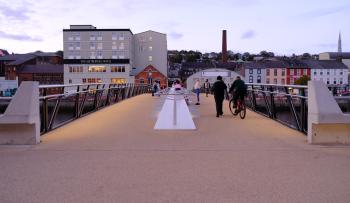
Victory for cycling in Portugal: Government approves new road code
On 24 July the Portuguese government passed a new highway code with overwhelming support. This new road code will increase cyclist and pedestrian safety and propel Portugal’s legal road framework into the 21st century. The success of the passing also illustrates for others the substantial gains that occur when governments listen to cycling advocates and work cooperatively.
The legislation that passed is a second draft of the road code which, with the assistance of ECF members Associação pela Mobilidade Urbana em Bicicleta (MUBi) and Federação Portuguesa Cicloturismo e Utilizadores de Bicicleta (FPCUB), was a much improved version of the first draft after the initial draft was met with resounding criticism from Portuguese cycling groups.
Portugal now exemplifies what can happen when governments and cycling advocacy groups work cooperatively to improve cycling in their countries.
Some notable sections of the recent legislation are:
- The driver of a motor vehicle must maintain a lateral distance of at least 1.5 meters, to prevent accidents between their vehicle and cycles transiting in the same lane.
- Drivers must give way to bicycles crossing the carriageway in marked passages.
- Emphasizes that it is the duty of the driver of each vehicle to ensure that their behavior does not endanger the safety of pedestrians and cyclists, as well as other vulnerable road users.
For those who lobbied and advocated for these changes this new legislation has been a long time coming.
“This has been a great victory” said Ana Pereira from MUBi, “lots of things have changed.” Ms. Pereira highlighted several areas that came as a big change from the first draft to the second. These include being allowed to carry one child on a bicycle even while not on a cycle path, no implementation of mandatory helmet laws, being able to ride two abreast, the ability to use trailers and tricycles (cargobikes) on cycle paths, and allowing children up to the age of ten to cycle on the sidewalks.
Enabling children and granting them the legal right to cycle follows the ECF’s Charter of Vancouver which explicitly states the importance of allowing children to cycle. Furthermore, not implementing a mandatory helmet law is another outstanding gain as helmet laws have a negative effect on cycling.
These items are of specific importance because just this year, Spain introduced regulations that made helmets mandatory by law and banned unaccompanied children under the age of 14 from cycling despite the hard work of Spanish and European cycling advocacy groups who lobbied against these implementations.
The Spanish government’s dismissal of this advocacy in April led Spanish 1998 Tour de France winner Pedro Delgado to walk out of a meeting with director of the Spanish national traffic authority (DGT), María Seguí, after a heated discussion about government plans to ban cycling without helmets. Delgado said that the Spanish officials were being “pig-headed”. Thankfully for Portugal, their government listened.
They understood that it is more crucial for governments to make the roads safer for cyclists rather than implementing restrictions because safer roads mean more cyclists and there is safety in numbers.
However, the work is not over in Portugal.“The next step is to increase awareness of these new laws, educate everyone on the roads and make sure the laws are enforced” said Ms. Pereira. “If nothing is done to disseminate and enforce the only time people will find out about the new laws is after they have broken one and the roads will not be any safer.”
But for right now Portuguese cyclists and pedestrians can enjoy their victory. And, in a few months the new laws will come into effect, raising Portugal’s standing as a significantly safer cyclists’ haven of the 21st century.
The entire legislation can be read in Portuguese here.
See the press release from MUBi here
About the Author
Gregory Markus is a Communications Assistant at the ECF. He just received his Masters in European Studies from the University of Amsterdam. He currently lives in Amsterdam and is learning how to ride his bike no-handed.
- See more at: http://ecf.com/news/rtf-recognizes-importance-of-speedlimits/#sthash.Ax4...
About the Author
Gregory Markus is a Communications Assistant at the ECF. He just received his Masters in European Studies from the University of Amsterdam. He currently lives in Amsterdam and is now planning a vacation to Portugal.
- Log in to post comments
Contact the author
Recent news!
Contact Us
Avenue des Arts, 7-8
Postal address: Rue de la Charité, 22
1210 Brussels, Belgium











